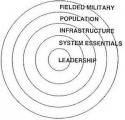Phase 4: Doing it. None of this changed until January 2007, when Bush announced his intention to "surge" 17,500 additional forces to Baghdad (and 4,000 more to Anbar). More support troops have since been tapped to also go to Iraq. But, it is vital to remember, the surge is not the strategy -- it is a means to implement a strategy. The strategy is to to provide actual population security, tamp down sectarian violence, and create space for national reconciliation and reconstruction. To implement this strategy, Bush replaced Casey with Petraeus, who appears committed to implementing the COIN manual he co-sponsored, spreading American troops out into smaller bases from which they can work with Iraqi forces to provide local security. Moreover, even Odierno, the new MNC-I commander, appears to have learned something from his early mistakes, and he seems to be committed to treating the Iraqi population as the focus of operations.
As the Krepinevich briefing makes clear, this shift makes sense from the perspective of COIN best practices and the new COIN field manual. There are other successful approaches to COIN, including what the briefing calls "the Roman Strategy" ("make a desert and call it peace"), which was basically the approach Saddam used to prevent sustained insurgency in Iraq. But, as the briefing properly notes, adopting this approach (or even somewhat softer, but still highly coercive COIN practices, such as those used by the Americans effectively in the Philippines between 1899-1902), is incompatible with norms against targeting civilians embraced by the U.S. military and political leadership. So, with the Roman strategy off the table, that leaves the "clear, hold, and build" option. However, as the briefing makes clear, this strategic shift may simply be too little, too late. What the briefing doesn't say is that it is also unclear whether employing COIN best practices will work in the context of not only a raging insurgency (in Baghdad, Anbar, Diyala), but also a sectarian civil war (in Baghdad, Diyala, and increasingly Kirkuk), diffuse criminal anarchy and militia rivalry (in the South), and endemic separatist tendencies (in Kurdistan).








 ).
). )
)


Bookmarks